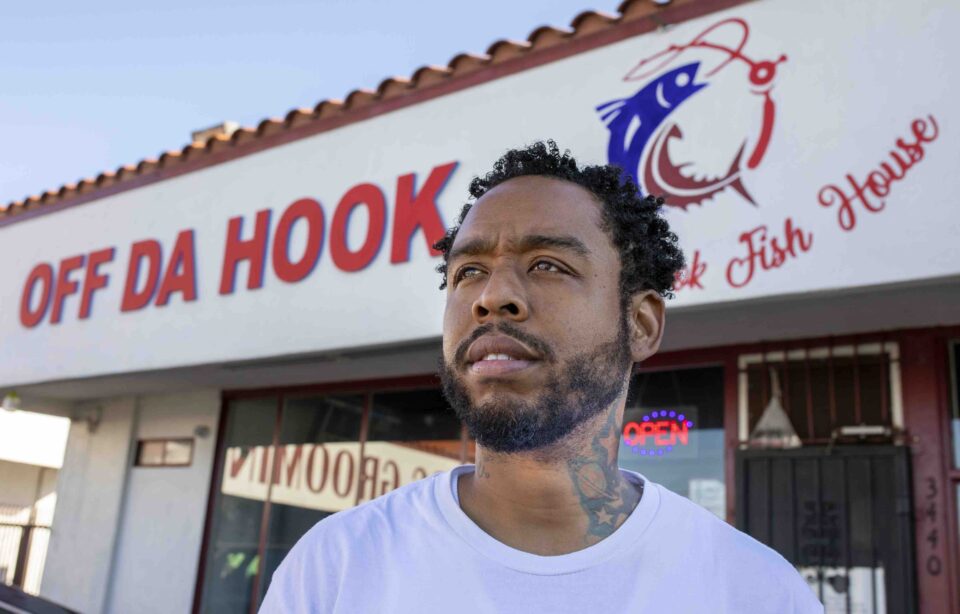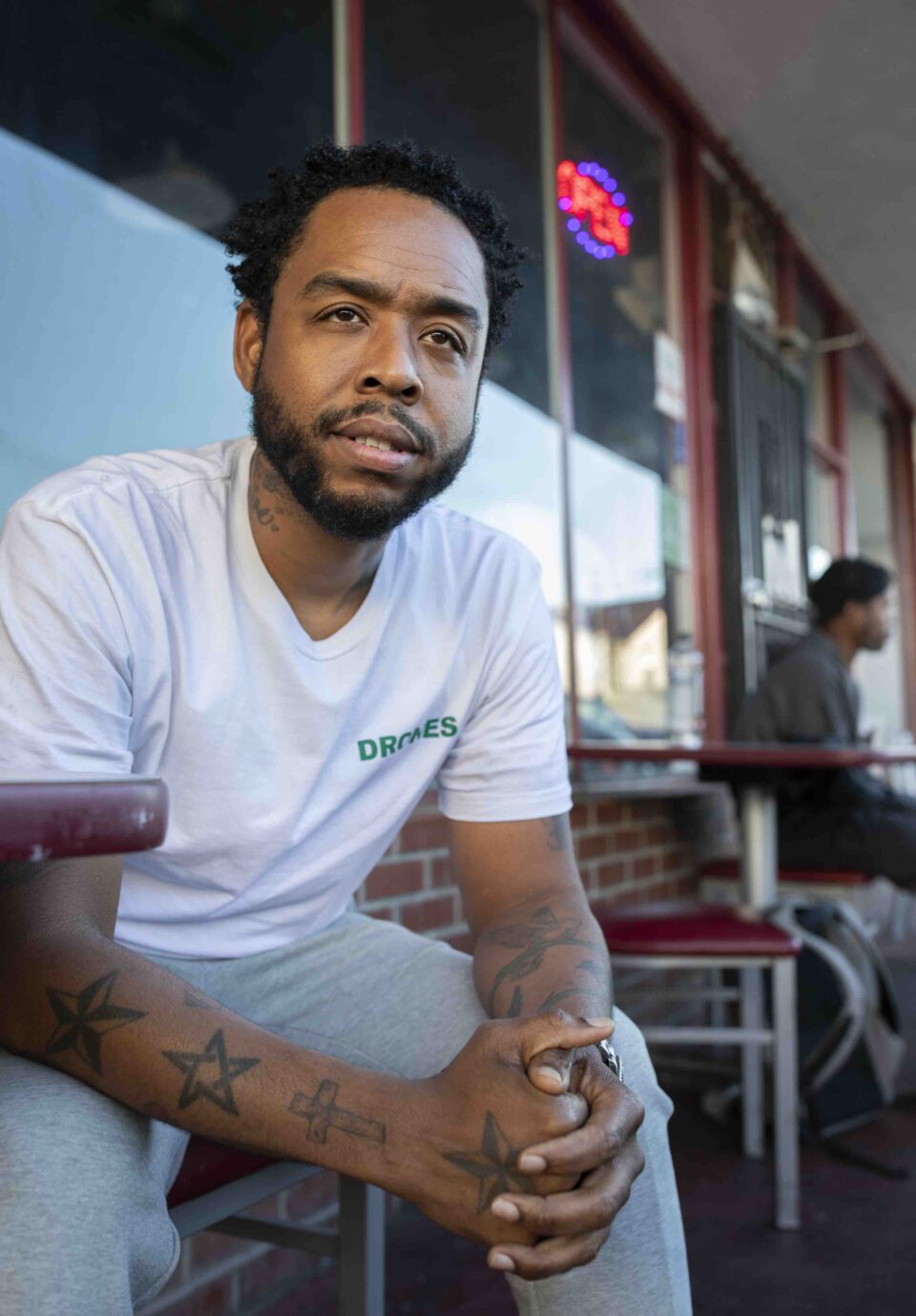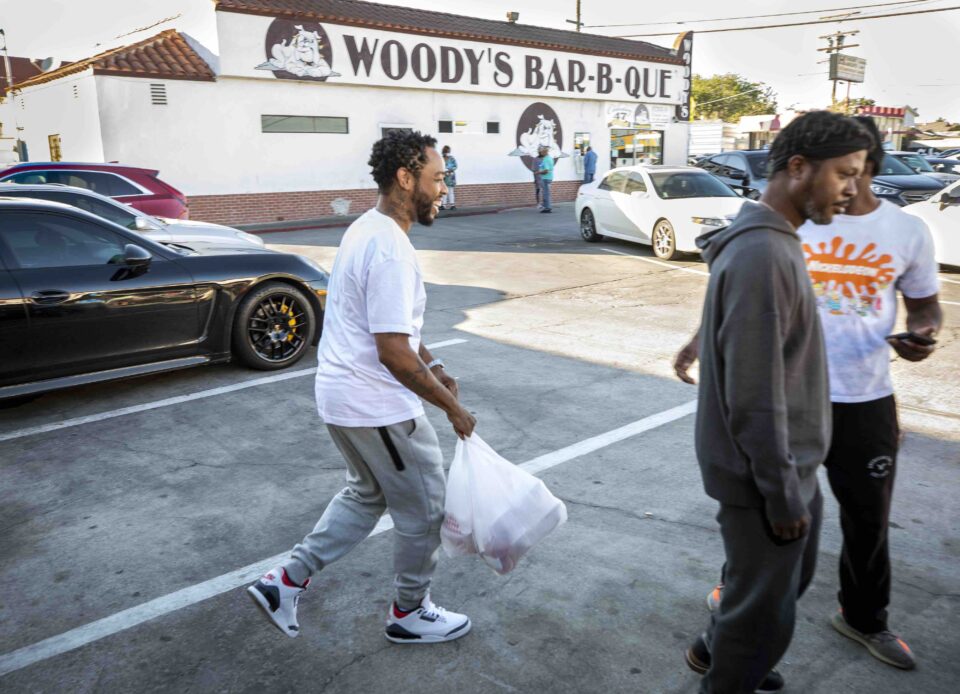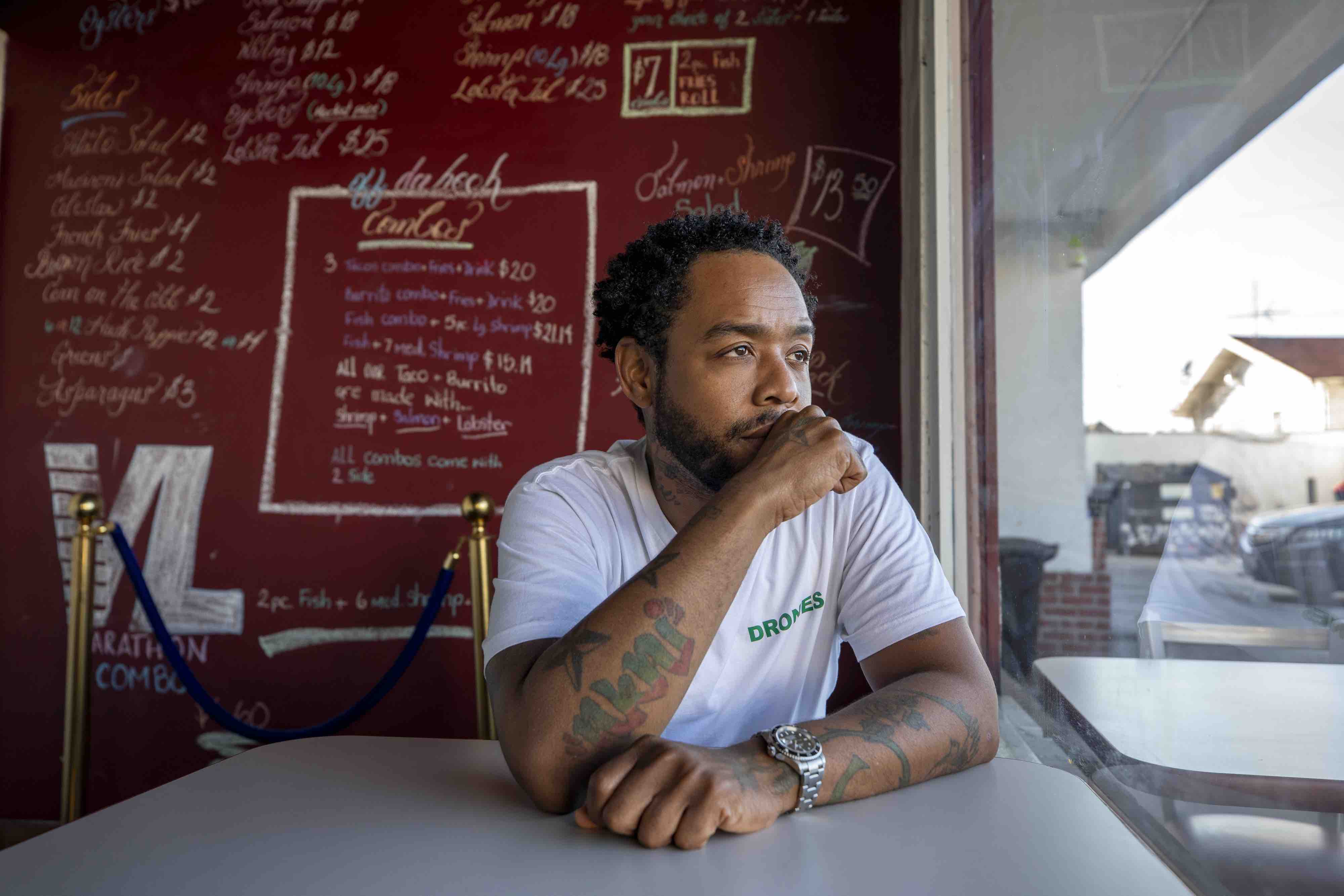This article appears in FLOOD 12: The Los Angeles Issue. You can purchase this special 232-page print edition celebrating the people, places, music and art of LA here.
The work of musician-producer Terrace Martin takes him to the far reaches of the world, across Los Angeles and back again, but he’ll always return to the Crenshaw District that knows him best. This is where he grew up, alongside future superstar players Thundercat and Kamasi Washington, and where he mastered jazz, funk, and hip-hop. “It’s home,” Martin says. “It’s my village.”

Producer-rapper-musician Terrace Martin. He was the Crenshaw District of Los Angeles, standing outside the Off Da Hook Fish House. He was preparing to release a new album, “DRONES,” on 11.05.21.
On his recent solo album Drones, the track “Leimert Park” is sultry, woozy, jazzy, and funky, offering up a statement of commitment to the African American neighborhoods that reared him. He takes the lead vocal himself, calmly rapping: “We can fall out, fall back, hate each other, reconnect, and get back,” and, “Crenshaw, Inglewood, Compton, any hood on God, bro / Imma always pull up.”
One of his frequent destinations in Crenshaw is Off Da Hook Fish House on Slauson Avenue. His friend owns the place, and Martin likes the fried snapper and fish tacos—or sometimes just to come and sit, look, and listen. Next door is Woody’s Bar-B-Que, and across the street is Slauson Donuts, all good places to eat, he notes.
“If you’re honest with yourself, you will be you wherever you go. If I do country-western, I’m gonna be me. If I do folk music, I’m gonna be me. If I go hang out with Joni Mitchell, I’m gonna be me. When I play with Kendrick, I’m me.”
Martin is still deeply inspired by Crenshaw, a place of vibrant music and culture, of affluent Black business owners and artists. But it’s also full of disappointment and tragedy, a place where “some crazy shit may happen out the blue,” he says. “What I like coming over here for, I can’t hear it every day. I gotta come over here and hear this, and then I gotta go somewhere and process it.”
These days, he lives in the San Fernando Valley, close to the studios he’s working in most days when he’s not playing a gig out of town. Martin is known as a sax player of intense warmth and bop/blues innovation, but he’s also made a mark as a hugely prolific multi-instrumentalist and producer, collaborating with Kendrick Lamar, Snoop Dogg, YG, and more across a wide spectrum of sounds.

Producer-rapper-musician Terrace Martin. He was the Crenshaw District of Los Angeles, sitting outside the Off Da Hook Fish House. He was preparing to release a new album, “DRONES,” on 11.05.21.
Ahead of Drones, the three-time GRAMMY nominee recorded an EP of stirring jazz instrumentals as part of the quartet Dinner Party, with Washington, Robert Glasper, and 9th Wonder. Both records were released on Martin’s Sounds of Crenshaw label. “If you’re honest with yourself, you will be you wherever you go,” Martin says of his ease within multiple genres. “If I do country-western, I’m gonna be me. If I do folk music, I’m gonna be me. If I go hang out with Joni Mitchell, I’m gonna be me. When I play with Kendrick, I’m me.”
For his friends gathered outside Off Da Hook, Martin is still a fixture in the community, which he considers the heart of Los Angeles. There’s great food here—he mentions Post & Beam, a farm-to-table restaurant in Baldwin Hills, and the surprisingly excellent vegan selection at Earle’s, a hot dog spot on Crenshaw Boulevard.
“Somebody’s gonna be playing some music in Leimert in the middle of the fucking day. And I’ll roll me a joint to smoke while I’m walking, because everybody’s having a good time.”
A perfect day in LA for Martin would begin early in Leimert Park, a widely celebrated mecca for the arts. He’d have a breakfast sandwich and coffee at Harun Coffee—owned by Chace Infinite, longtime hip-hop manager, historian, rapper, and associate of A$AP Rocky. From there, he might stroll over to Eso Won Books, the eclectic, Black-owned 1,800 square foot bookstore known personally to Toni Morrison, Spike Lee, and Barack Obama, who have all appeared there.
“Then I would go to the park, sit and chill, meditate,” says Martin. “Somebody’s gonna be playing some music in Leimert in the middle of the fucking day. And I’ll roll me a joint to smoke while I’m walking, because everybody’s having a good time.”
For lunch he’d hit up one of the “amazing food trucks,” then take a drive, and maybe roll down the same streets filmed for 1991’s Boyz n the Hood. Then dinner at Off Da Hook, another joint, and back home to bed, the end of an unusually full day. “I squeezed in a lot of shit,” Martin says with a laugh of his imagined tour. “I probably wouldn’t do all that in one day.” FL

Producer-rapper-musician Terrace Martin (on left). He was in the Crenshaw District of Los Angeles, leaving the Off Da Hook Fish House with his food order.







